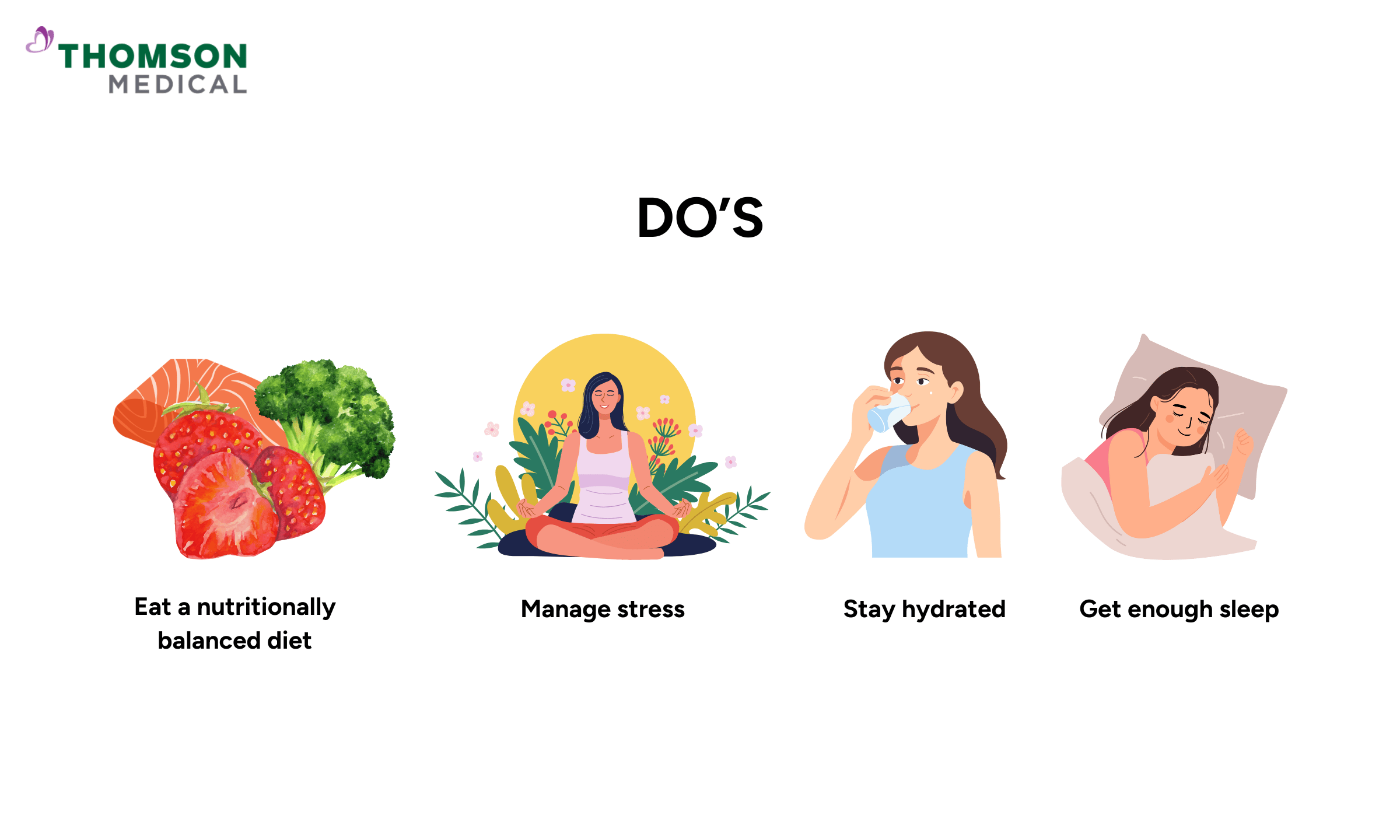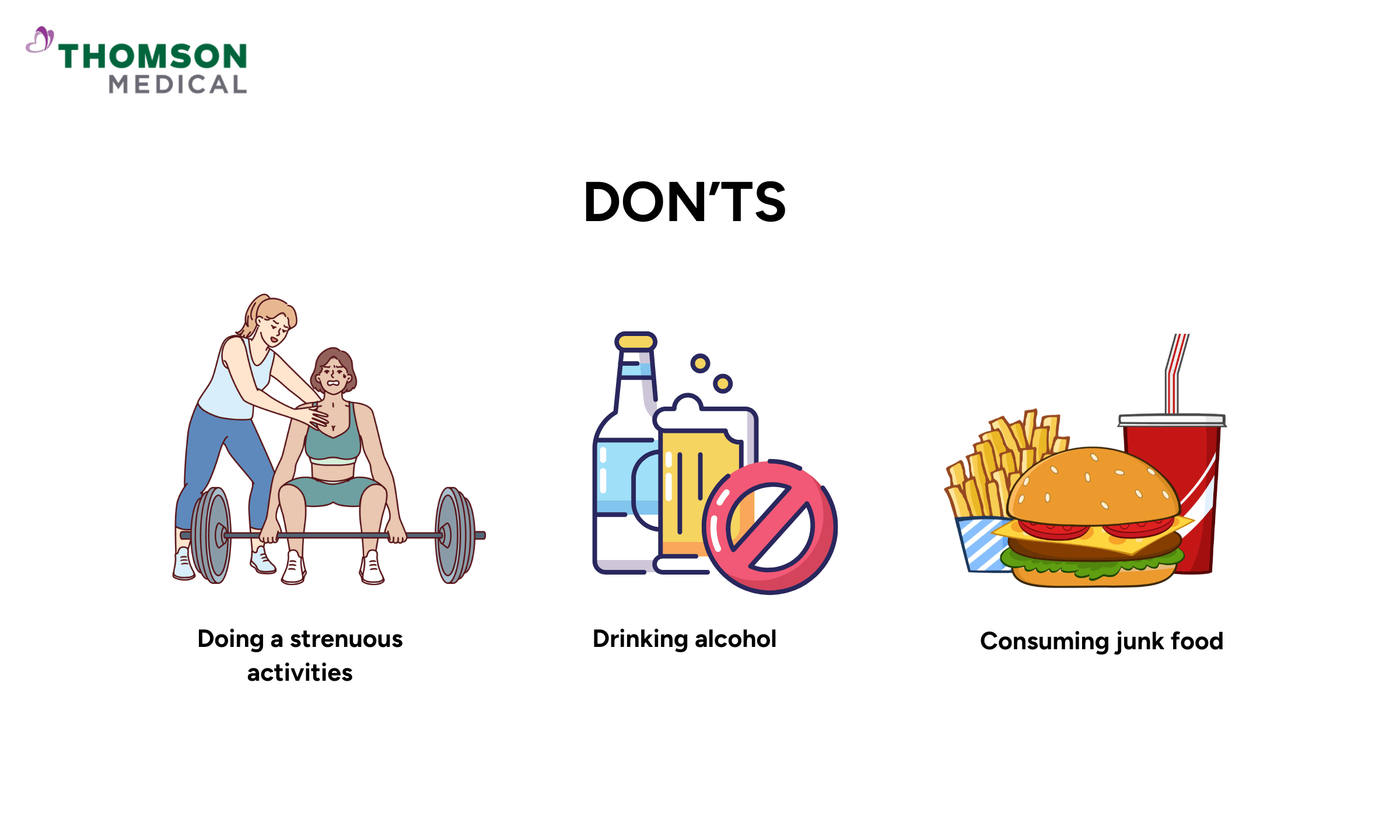For couples that are facing a hard time conceiving or are experiencing unexplained infertility, an intrauterine insemination (IUI) is usually taken as the initial fertility treatment. After the procedure, you may wonder, "What can I do after IUI to improve success?"
While IUI increases the likelihood of sperm fertilising the egg by placing it directly in the uterus, the success rate still varies from 15% to 20%, meaning that it's common for couples to undergo multiple IUI cycles. However, you can increase your chances of a successful pregnancy post-IUI with lifestyle adjustments.

What to do after IUI
After the IUI artificial insemination process, the sperm does not need to travel that far to the egg. To increase the chances of fertilisation, here are some tips to help you improve the odds, including:
Eat a nutritionally balanced diet
To allow the fertilisation process, the egg must be healthy so it can grow into an embryo and travel to the womb to implant. To support this, you need a well-balanced diet, including food that is rich in antioxidants, lean protein, and omega-3 fatty acids.
Consider these foods to boost your chances of conceiving, including dishes that are high in:
AntioxidantsAntioxidants such as vitamins C or E are known to fight free radicals in the body that can damage both sperm and egg cells, reducing fertility. Some foods that are rich in antioxidants, such as:
Strawberries (rich in vitamin C and folate, which can help increase fertility).
Oranges (rich in vitamin C and other antioxidants such as flavonoids).
Spinach (rich in vitamin C, vitamin E, and and iron)
Almonds (rich in vitamin E).
Omega-3 fatty acids
Food with a high content of omega-3 fatty acids can help to increase fertility by improving hormonal balance, boosting egg quality, and helping support embryo implantation. Some foods that are rich in these nutrients, such as:
Fatty fish, such as salmon, sardines, and mackerel.
Nuts and seeds, such as walnuts, flax seeds, chia seeds, and sunflower seeds.
Lean protein
Food rich in lean proteins can help in the fertilisation process by providing the essential amino acids to support overall reproductive function. Some foods that are rich in lean proteins include:
Chicken
Lean cuts of beef
Tofu
Tempeh
Eggs
Stay hydrated
To increase your chances of pregnancy, you need to meet your daily water needs. An insufficient water intake can cause cervical mucus to become too acidic, potentially damaging sperm as they move towards the egg.
Try to drink between 2 to 3 litres of water every day to ensure that your body is properly hydrated.
Taking supplements
To help increase the success rate of intrauterine insemination, couples can consider taking supplements that contain:
Zinc and coenzyme Q10 (CoQ10), which are beneficial to help the development of healthy eggs develop properly and ensure proper fertilisation.
Iron and vitamin D, which can help improve your fertility.
Vitamin B6, which is crucial for the proper functioning of the ovaries and plays a vital role in the production of oestrogen and progesterone.
Selenium, which can help reduce the chance of a miscarriage.
Folic acid, which is beneficial to ensure a healthy pregnancy after a successful implantation.
Manage stress
Create a calm and stress-free environment, as stress can affect your hormonal balance. When you are stressed, cortisol levels in the body are elevated and can disrupt reproductive hormones such as oestrogen and progesterone in women, possibly leading to fertility issues.
To maintain your stress level, practice stress management techniques such as building a good social support system, practicing meditation, keeping a positive attitude, or doing breathing exercises.
Get enough sleep
You should also aim for 7-9 hours of sleep each night, as a good night's rest can increase the chances of a successful pregnancy. Sleep deprivation can cause the body to produce more stress hormone (cortisol), which is bad for fertility and lowers reproductive hormone levels.
Fertility specialists
Loading...
Activities to avoid after IUI
In addition to the recommended lifestyle above, to help preserve your fertility and increase your chances of success, you need to avoid certain practices during the post-IUI period, such as:

Doing a pregnancy test too early
After undergoing IUI treatment, it is understandable if you feel anxious and impatient to know the results. However, it is important to wait at least two weeks before taking a pregnancy test.
This is because the test detects the presence of human chorionic gonadotropin (hCG), a hormone that only appears during pregnancy. Taking the test too early can result in false readings, such as:
False negative:
A false negative result can occur if your pregnancy hormone level has not reached the measurable amount.
False positive:
This can occur if you have been taking fertility medications that contain hCG to help ovulation during IUI (SO-IUI), and it still isn't fully metabolised.
Doing a strenuous activities
Avoid engaging in strenuous exercise during the post-IUI period. This is because high-impact physical activities could interfere with the conception process and decrease the likelihood of a successful pregnancy.
If you want to continue regular exercise, it's better to stick to more moderate exercises, such as walking, yoga, or cycling. In addition to keeping your body fit, these exercises help increase blood flow to the uterus, which is necessary for a successful implantation.
Drink too much alcohol and caffeine
Alcohol consumption and caffeine intake after IUI could decrease your chances of conception and affect fertility.
But if you want to consume it, try to limit your daily coffee consumption to one or two cups and consider including decaffeinated options. Also, after the IUI procedure, you should drink no more than one glass of alcohol per day.
Consuming processed foods
Consuming processed foods that are rich in ultra-processed carbohydrates, saturated fats and trans fats can lead to infertility issues. This can get even worse if you are also deficient in fibre and consume foods with excessive added sugar.
Instead, choose fresh, home-cooked meals rich in nutrients like omega-3 fatty acids, antioxidants, and lean proteins, which are more beneficial for your overall health and fertility.
Taking pain relief medicines
One of the common side effects of an IUI procedure is cramping, and usually, one of the treatments is to take pain relief medicines. However, avoid doing so after this fertility treatment, as it may affect the chances of conception.
If severe cramping persists and becomes unbearable, it's best to consult your fertility doctor. They can help prescribe pain relief medications that are safer for your fertility.
If you want more advice on what to do after IUI for success, request a consultation at Thomson Fertility Centre. Our fertility specialists can help to provide advice that is tailored to your fertility condition.
FAQ
How can I increase my chances of implantation after IUI?
To help increase your success rate after an IUI procedure, there are a few steps you can take, such as:
Maintain a nutritionally balanced diet rich in antioxidants, omega-3 fatty acids, and lean protein.
To meet your daily water needs, try to drink between 2 to 3 litres of water every day.
Get adequate sleep for 7-9 hours per night.
Regularly take supplements to maintain fertility.
Manage your stress level through activities like meditation or breathing exercises
Avoid strenuous physical activities
What to do immediately after IUI?
After the IUI procedure, you might be advised to take a short rest before resuming your normal activities and especially strenuous exercise. There are some mild symptoms that you can experience after IUI, such as mild cramping or light spotting for one or two days.
What should I avoid after IUI?
To increase your chance of conception after IUI, there are a few things you should avoid, such as:
Engaging in a heavy physical activity.
Performing a pregnancy test too early.
Consuming excessive caffeine or alcohol.
Consuming foods high in saturated and trans fats.
Taking a pain relievers to deal with cramping without consulting your healthcare providers.
What food should I avoid after IUI?
After undergoing an IUI procedure, it's recommended that you limit food such as:
Fast foods
Coffee
Any alcoholic beverages
Instead, focus on nutritious foods such as:
Fruits and vegetables rich in antioxidants (strawberries, oranges, spinach).
Foods with omega-3 fatty acids (fatty fish, nuts, seeds).
Lean proteins (chicken, tofu, eggs).
Fresh, home-cooked meals.
How do I know if my IUI is successful?
The only reliable way to confirm if the IUI has been successful is through a pregnancy test two weeks after the procedure. But there are common symptoms that may indicate a successful IUI, including:
Cramping
Thicker cervical mucus
Nausea or vomiting (morning sickness)
Breast tenderness
Spotting
Headaches and fatigue
Emotional fluctuations
How soon can you test positive after IUI?
To determine the result of this artificial insemination, you need to wait at least two weeks before taking any pregnancy test. Because taking the test too early can result in inaccurate results, such as:
A false negative result, which indicates that you are not pregnant, but in fact, the contrary is true.
False positive results, which indicate that you are pregnant when you are not.
The information provided is intended for general guidance only and should not be considered medical advice. For personalised recommendations from a fertility specialist, request an appointment at Thomson Fertility Centre.
For more information, contact us:
Thomson Fertility Centre
- Paragon: +65 6252 7766
